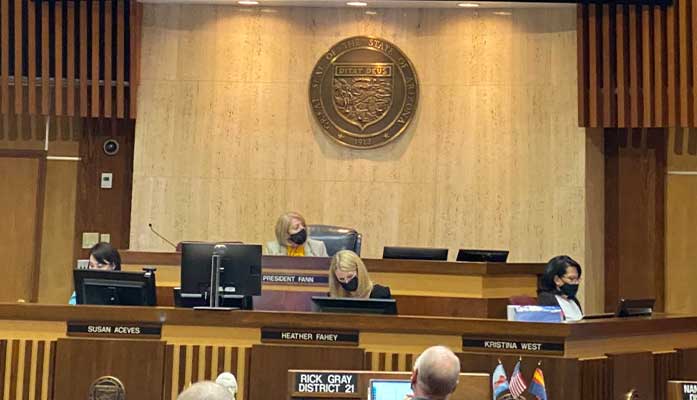
Voters To Decide Career Fate Of Arizona Judges In 2024 General Election
By Daniel Stefanski |
A measure to potentially reform Arizona’s judicial retention system is heading to the November General Election ballot.
Last Wednesday, the Arizona Legislature passed SCR 1044, which is another ballot referral for state voters to consider in the all-important election this fall. If passed, the measure would “constitutionally replace term limits for Arizona Supreme Court justices, intermediate appellate court and superior court judges with terms of good behavior and outline conditions that require a vote of retention for a justice or judge; [and would] require an intermediate appellate court judge who is subject to a vote of retention to be elected on a statewide basis” – according to the purpose statement from the Arizona State Senate.
The Arizona House of Representatives approved the measure with a 31-29 vote, sending the proposal back to the Senate since it was amended. The Arizona Senate then concurred with the changes with a 16-10 vote (with four members not voting).
The Arizona Senate Republicans Caucus “X” account championed the passage of this measure, posting, “Democrats HATE when judges respect the justice system by accurately interpreting our laws, and as a result, they want to punish these judges for doing so when their rulings go against radical Left ideologies. Today, all Senate Democrats voted ‘NO’ on protecting ethical judges and want to allow bad actors to continue to fly under the radar within our justice system.”
Legislative Democrats and progressive interest groups were very vocal in their opposition of the measure. Senator Priya Sundareshan said, “This ballot referral would be a fundamental reworking of our judicial retention system in fact it would move us away from a retention process towards lifetime appointments.”
Representative Analise Ortiz added, “SCR 1044 would take away my right and the right of my constituents who want to vote not to retain those judges who approved the 1864 total abortion ban. It says your voice doesn’t matter, we are throwing out your vote. That’s what authoritarianism looks like, and it’s terrifying.”
Many Democrats and their allied organizations pointed to Republicans’ motivations being the protection of two Arizona Supreme Court justices, who voted in favor of the legal standing of the state’s longtime abortion ban earlier this year. These justices, Kathryn King and Clint Bolick, are up for retention on the November General Election ballot this year.
Last month, Bolick wrote an opinion piece for The Arizona Republic on the dangers of weaponizing the judicial retention system over controversial decisions from courts. He wrote, “Justice O’Connor warned of the danger that ‘a retention election will be infected with issue-based politics.’ That is exactly what is happening, placing her precious legacy in grave jeopardy. In our state, the people have the ultimate lawmaking power, including the ability to overturn our decisions. But we cannot afford to have conscientious judges voted out for unpopular decisions.”
Daniel Stefanski is a reporter for AZ Free News. You can send him news tips using this link.

